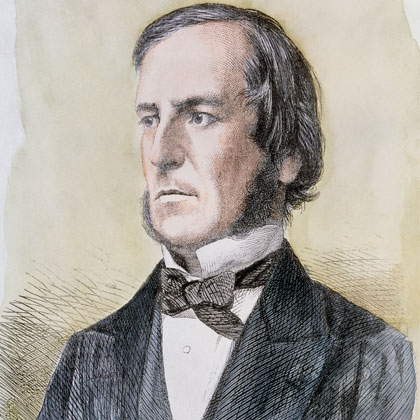Browsing on your smartphone; sending a text message to a friend; programming the digital TV to record and play back your favourite program; attaching a document to an email and sending it to a colleague or teacher… all of these are functions you probably perform almost daily in your busy modern life. And all of them happen ultimately thanks to the application of the work of 19th Century Irish mathematician and thinker George Boole (1815-1864).
To celebrate the incredible life and work of George Boole, students around the world are invited free to participate in the University College Cork’s (UCC) ‘Boole2School’ Day on Monday 2nd November, 2015.
Registered students and schools will have the opportunity to engage in Boolean maths lessons and activities during which they will be introduced to the mathematics, logic and legacy of the wonderful Mister Boole.
The George Boole 200 Programme, with the support of UCC’s Maths Department, have created lesson plans and resource packs for all students and teachers who would like to take advantage of this mathematically exciting opportunity. To register for ‘Boole2School Day’, teachers and students need simply to follow the link below!
‘Boole2School Day’ – Get Involved!
Who was George Boole?
Boole was a self-taught mathematician who eventually became the first Professor of Mathematics at University College Cork in Ireland. He is often considered the forefather of the information age, mainly because of his theoretical study of human thought processes through the application of algebra using binary functions the use of ‘1’ or ‘0’ to represent ‘true’ or ‘false’ values. Boole’s work led to a mathematical methodology known as ‘Boolean Logic’ and today the use of this logic is apparent in most of the electronic and communication gadgets that surround us.
According to his alma mater, the University College Cork,
George Boole’s work shows us that mathematics is a most creative and forward-looking subject, a way of seeing new structures. Boole was an unorthodox genius who … laid down foundations which set mathematics on a new path.”
Boole transformed the discipline of mathematics. His most famous work, An Investigation of the Laws of Thought (1854), was described by the philosopher and mathematician Bertrand Russell as “the work in which pure mathematics was discovered”.
George Boole: A Life and Legacy
Lead Image and Insert Images courtesy of University College Cork and the County Cork ‘George Boole 200’ bicentennial project: http://georgeboole200.ucc.ie/





